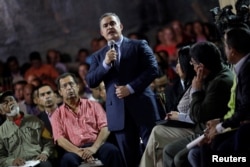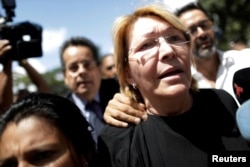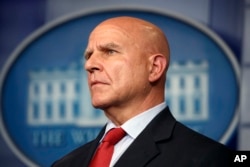Latin American trade bloc Mercosur suspended Venezuela’s membership hours after the newly elected constituent assembly ousted the country’s chief prosecutor.
After a meeting in Brazil’s financial center, Sao Paulo, Brazilian Foreign Minister Aloysio Ferreira, told reporters: “We are saying: Stop with this! Enough with the deaths, enough with the repression. It is not possible to inflict such torture to the people.”
The suspension is indefinite. Venezuela joined the bloc in 2012 and has been suspended before for failing to uphold its commitments.
Chief prosecutor removed
Meanwhile, the constituent assembly, made up of allies of President Nicolas Maduro, voted to remove chief prosecutor Luisa Ortega on Saturday and swore in her replacement Tarek William Saab. Saab was previously Venezuela’s Human Rights Ombudsman, but the United States has recently criticized him for failing to prevent human rights abuses.
After the vote, dozens of Venezuela’s National Guard members surrounded Ortega’s office and refused to allow her entry.
Ortega said the troops attacked her with riot shields to prevent her from entering the building.
“This is a dictatorship,” she told reporters.
Ortega’s firing had been expected. Members of the constituent assembly had said it would be their first priority.
The assembly was officially installed Friday.
In another development Saturday, Venezuelan authorities released opposition leader Leopoldo Lopez from military prison and returned him to house arrest, his wife said via Twitter.
Lopez and Antonio Ledezma, another opposition leader, had both been under house arrest for their opposition activities when they were placed in a military prison Tuesday. Twitter video showed intelligence agents dragging Lopez and Ledezma out of their homes and shoving them into cars.
Ledezma was returned home and to house arrest Friday.
McMaster interview
Also Saturday, U.S. National Security Advisor H.R. McMaster said U.S. intervention in Venezuela is unlikely.
In an interview that aired Saturday on MSNBC, McMaster said he doesn’t want to give Maduro the chance to further blame “Yankees” from the U.S. for the once-oil-rich country’s economic failures.
“It’s important for us to place responsibility for this catastrophe on Maduro’s shoulders. He is the one who has caused it, and he’s the one who’s perpetuating it,” the three-star general said.
The Trump administration placed sanctions on Venezuela, following a recent vote to establish a constitutional assembly that has power over all other branches of government.
McMaster has previously called on other nations to rescue Venezuela from Maduro’s “authoritarian dictatorship.”
The assembly is expected to rewrite the country’s constitution in order to cede more power to Maduro.
It was elected last week Sunday in a national election that was boycotted by opposition supporters and called a sham by U.S. Ambassador to the United Nations Nikki Haley.
“Maduro’s sham election is another step toward dictatorship. We won’t accept an [illegitimate government],” she said in a post on Twitter. “The Venezuelan [people] & democracy will prevail.”
The United States, European Union and several Latin American countries have said they will not recognize the assembly.








